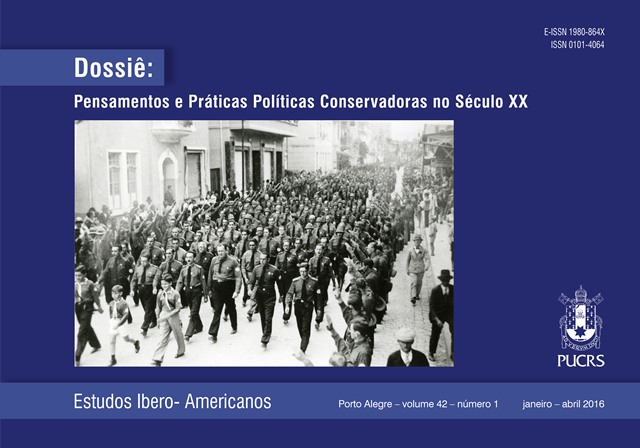Between reaction and restoration. Violence and the right in the beginning of the 1960s crisis in Uruguay
DOI:
https://doi.org/10.15448/1980-864X.2016.1.21839Keywords:
Uruguay, right, violence, Cold WarAbstract
Violence emerges as an objective fact in the analysis of the social and political crisis in Uruguay in the 1960s. However, most historical studies from Social and Political Sciences have identified theoretical elaborations and violent practices in the left or in the State, taking the year 1968 as starting point; this date concides with the apogee of the leftist armed struggle and the adoption of a legislation of exception to repress social protest. In this paper I propose two new approaches that contribute to the analysis of this period: 1. To review the chronology normally used to analyse the 1960s crisis; and 2. To include the perspective and interests of the right, which were part of the social and political fabrics during the most intense period of the Cold War in Latin America. In particular, this article offers a general cartography of the violence of the right, in which different strategies, types and justifications are highlighted, as well as the degrees and scale of violent activities with political objectives.
Downloads
References
AGEE, Philip. La CIA por dentro. Diario de un espía. Buenos Aires: Editorial Sudamericana, 1975.
ALDRIGHI, Clara. El programa de asistencia policial de la AID en Uruguay (1965-1974). Estudos Ibero-Americanos XXXIV, PUCRS, v. xxiv, n. 1, p. 181-204, jun. 2008.
______. La izquierda armada. Ideología, ética e identidad en el MLN Tupamaros. Montevideo: Ediciones Trilce, 2001.
______. El caso Mitrione. La intervención de Estados Unidos en Uruguay (1965-1973). Montevideo: Ediciones Trilce, 2007.
ANSALDI, Waldo; GIORDANO, Verónica. América Latina. Tiempos de violencias. Buenos Aires: Ariel, 2014.
BACCHETTA, Víctor. El asesinato de Arbelio Ramírez. Montevideo: Doble Click Editoras, 2010.
BROQUETAS, Magdalena. Los frentes del anticomunismo. Las derechas en el Uruguay de los tempranos sesenta. Contemporánea. Historia y problemas del siglo XX, Montevideo, v. 3, 11-29, 2012.
______. La trama autoritaria. Derechas y violencia en Uruguay (1958-1966). Montevideo: Ediciones de la Banda Oriental, 2014.
BRUNO, Mauricio. La caza del fantasma. Benito Nardone y el anticomunismo en Uruguay (1960-1962). Montevideo: FHCE-Udelar, 2007.
CHERONI, Alción. El pensamiento conservador en el Uruguay. Montevideo: CLAEH, 1986.
GALVÁN, Valeria. El Movimiento Nacionalista Tacuara y sus agrupaciones derivadas: una aproximación desde la historia cultural. Tesis de Maestría en Sociología de la Cultura. Buenos Aires: Instituto de Altos Estudios Sociales, 2008.
HUGGINS, Martha H. Political policing. The United States and Latinamerica. Durham: Duke University Press, 1998.
HUNT, Howard. Memorias de un espía. De la CIA al escándalo Watergate. Barcelona: Editorial Noguer, 1975.
JACOB, Raúl. Benito Nardone: el ruralismo hacia el poder. 1945-1958. Montevideo: Ediciones de la Banda Oriental, 1981.
JOSEPH, Gilbert. Lo que sabemos y lo que deberíamos saber: la nueva relevancia de América Latina en los estudios sobre la Guerra Fría. In: SPENSER, Daniela (Coord.). Espejos de la Guerra Fría: México, América Central y el Caribe. México: Centro de Investigaciones y Estudios Superiores de Antropología Social, 2004. p. 67-92.
MARCHESI, Aldo Marchesi; YAFFÉ, Jaime. La violencia bajo la lupa: una revisión de la literatura sobre violencia política en los sesenta, Revista Uruguaya de Ciencia Política, Montevideo, v. 19, p. 95-118, 2010.
McGEE DEUTSCH, Sandra Mc Gee Deutsch. Las derechas. La extrema derecha en Argentina, Brasil y Chile. 1890-1939. Buenos Aires: Universidad Nacional de Quilmes, 2005.
REY TRISTÁN, Eduardo. A la vuelta de la esquina. La izquierda revolucionaria uruguaya. 1955-1973. Montevideo: Editorial Fin de siglo, 2006.
RICO, Álvaro. 1968: el liberalismo conservador. Montevideo: Ediciones de la Banda Oriental, 1990.
ROBIN, Marie Monique Robin. Escuadrones de la muerte. La escuela francesa. Buenos Aires: Editorial Sudamericana, 2005.
SAULL, Richard. El lugar del sur global en la conceptualización de la Guerra Fría: desarrollo capitalista, revolución social y conflicto geopolítico. In: SPENSER, Daniela (Coord.). Espejos de la Guerra Fría: México, América Central y el Caribe. México: Centro de Investigaciones y Estudios Superiores de Antropología Social, 2004. p. 31-66.
SENKMAN, Leonardo Senkman. El antisemitismo en la Argentina/1. Buenos Aires: CEDAL, 1986.
VARELA, Gonzalo. De la República Liberal al Estado Militar. Uruguay 1968-1973. Montevideo: Ediciones del Nuevo Mundo, 1988.
VAN AKEN, Mark. Los militantes. Una historia del movimiento estudiantil uruguayo desde sus orígenes hasta 1966. Montevideo: Fondo de Cultura Universitaria, 1990.
WEASTAD, Odd Arne. The Global Cold War. Third World Interventions and the making of our times. New York: Cambridge University Press, 2005.
Downloads
Published
How to Cite
Issue
Section
License
Copyright
The submission of originals to Estudos Ibero-Americanos implies the transfer by the authors of the right for publication. Authors retain copyright and grant the journal right of first publication. If the authors wish to include the same data into another publication, they must cite Estudos Ibero-Americanos as the site of original publication.
Creative Commons License
Except where otherwise specified, material published in this journal is licensed under a Creative Commons Attribution 4.0 International license, which allows unrestricted use, distribution and reproduction in any medium, provided the original publication is correctly cited.






